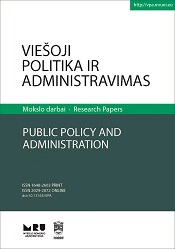Prieinamo turizmo neįgaliesiems su judėjimo negalia vertinimas: patirtis ir galimos kliūtys
Evaluation of Accessible Tourism for People with Reduced Mobility: Experiences and Potential Barriers
Author(s): Biruta Švagždienė, Dalia Perkumienė, Rūta DagytėSubject(s): Public Administration, Health and medicine and law, Tourism
Published by: Mykolas Romeris University
Keywords: accessible tourism; universal design; environmental accessibility; legal and social aspects of environmental accessibility; special needs;
Summary/Abstract: The article analyses the environment in terms of universal design, i.e., accessibility, environmental adaptation and potential barriers to the assessment of a person’s needs related to specific access requirements for the tourism service. The purpose of the article is to assess the accessibility of the tourism environment for persons with reduced mobility. Scientific literature with a focus on the concept of accessible tourism and universal design is analyzed. A holistic approach to the accessibility of tourism services and the adaptability of tourism infrastructure to persons with special needs, i.e., mobility disabilities, are presented. The article also discusses the legal aspects of regulating access to the environment for persons with disabilities and issues of social integration. The empirical part of the article is based on the satisfaction with environmental conditions as experienced by people with reduced mobility and the identification of possible obstacles. According to these areas, the article analyses how people with disabilities can access the main infrastructure sectors of tourism in Lithuania. The following methods were employed: the analysis of scientific literature and a survey of people with reduced mobility aimed to reveal the accessibility of the tourism environment from the point of view of people with reduced mobility and to develop guidelines for improving the situation. The study revealed that people with mobility disabilities rarely visit tourist destinations and hardly ever use tourism services because they experience accommodation, catering establishments, travel companies, cultural establishments, public transport in Lithuania as only partially accessible. The analysis of the indicators distinguishes the lack of a properly adapted ramp and automatically opening doors in buildings as the weakest area of access.
Journal: Viešoji politika ir administravimas
- Issue Year: 20/2021
- Issue No: 3
- Page Range: 382-396
- Page Count: 15
- Language: English

